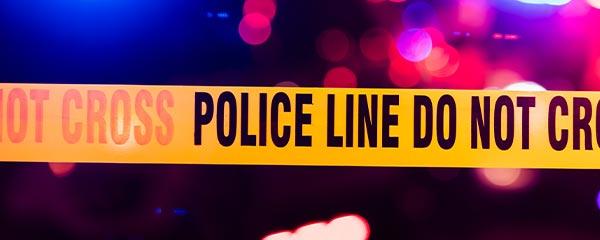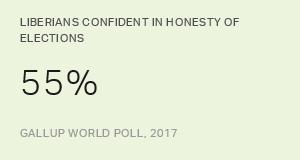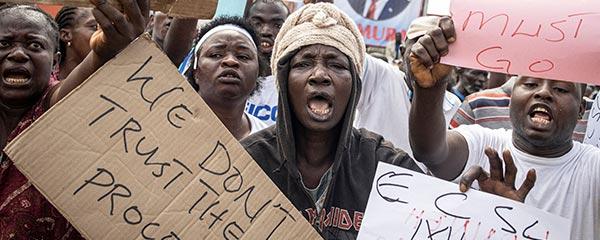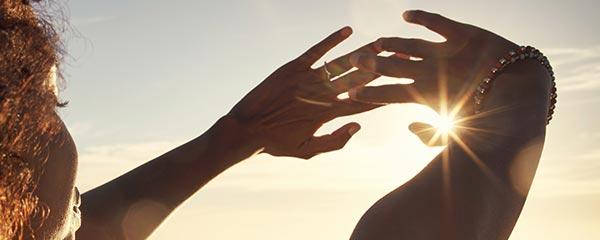Story Highlights
- 56% of Liberians feel their standard of living is getting worse
- 74% report not having enough money for food in the past year
- 32% felt safe walking alone at night in 2022, among the lowest in the world
WASHINGTON, D.C. -- Following tightly contested national elections on Oct. 10, with the two frontrunners separated by less than one percentage point of the vote, Liberians will head back to the polls on Tuesday to choose their next president. The winner will likely be whomever Liberians think offers the best chance of combating a multitude of issues, including poverty, corruption and safety concerns.
Quick Summary: Incumbent President George Weah, who garnered 43.83% of the vote in the previous election, rose to prominence as an international soccer star, playing with clubs such as AC Milan and Chelsea. He faces former Vice President Joseph Boakai, who received 43.44% of the initial round of voting. The two have met previously, with Weah defeating Boakai for the presidency in the 2017 election.
Living Standards: Bad and Getting Worse
Slightly over a third of Liberians (37%) in 2023 are satisfied with their standard of living, down from 41% in 2018 when Weah took office. Moreover, just 43% feel their standard of living is getting better, compared with 56% who feel it is getting worse.
Material shortages and poverty have weighed upon Liberia for decades, with food and shelter being primary concerns. Nearly three in four Liberians (74%) say there were times in the past 12 months when they did not have enough money for food, while 60% struggled to afford shelter.
These concerns have likely driven many Liberians to consider life outside the country. The latest Â鶹´«Ã½AV data show that 76% of Liberians say they would move permanently to another country if given the opportunity, one of the highest levels Â鶹´«Ã½AV has recorded in the world since 2007.
Liberia Ranks Among Least Secure Countries in the World
Liberia, which has undergone two civil wars since 1989, continues to suffer from insecurity, with residents ranking the country as unsafe on a variety of measures. Just a third of Liberians (32%) felt safe walking alone at night in 2022, far below the sub-Saharan African median of 51% and among the lowest in the world. High numbers of Liberians also reported having money or property stolen (53%) or being assaulted or mugged (29%) in the past year. Illegal drug use and trade have afflicted the country in recent years as well, with a UNFPA Liberia report estimating that 20% of youth use narcotic substances.
These factors find Liberia ranked at the bottom of Â鶹´«Ã½AV’s Law and Order Index for 2022 with a score of 49, while the global score stood at 83. Uncertainty in the local police force depressed the country’s score, with Liberians being far less confident in their local police (45%) than the median of 60% across all of sub-Saharan Africa.
The most recent data collected by Â鶹´«Ã½AV this year show that these unsafe conditions persist. Confidence in the local police has fallen even further, from 45% to 42%, while the percentage reporting being assaulted in the past year has remained largely flat, moving from 29% to 28%. Liberians’ reports of feeling unsafe walking alone have also remained nearly unchanged, suggesting that insecurity continues to be elevated throughout the country.
Slim Majority Approve of Weah, but Downward Trend Could Spell Trouble
This election will serve as a referendum on Weah’s leadership since 2018, which has proven to be a tumultuous time for Liberia. After enjoying high job approval ratings in the honeymoon period immediately after taking office, Weah’s approval has dipped. In the latest Â鶹´«Ã½AV poll, conducted just before the October election, 54% approved of his job performance, down from 65% in 2022.
Weah’s government has been hit with corruption charges throughout his term, including imposing U.S. sanctions on his chief of staff and other officials for reports of misappropriation of state assets and bribery. Most Liberians (81%) see corruption as widespread throughout the government, but this figure is largely in line with the average since 2007, suggesting the problem is far more entrenched in the government beyond just Weah’s administration.
Implications
Though making great strides in stability after the conclusion of the country’s second civil war in 2003, Liberia has faced headwinds in securing improved material standards across the country. Poverty, corruption, poor transportation and food shortages are widespread throughout the population and look likely to continue for the foreseeable future. COVID-19 weighed on an already fragile healthcare system still recovering from the 2014-2016 Ebola outbreak, which killed 4,810 people in the country, including 8% of the nation’s doctors, nurses and midwives.
Weah came to office in 2018 promising to fight corruption and transform the economy, areas where the country has fallen short. Weah has touted his successes in building new roads in rural areas but argues that he needs more time to make big strides due to setbacks from COVID-19.
However, Boakai contends that Weah has worsened Liberia’s position, campaigning under the slogan “Rescue” and imploring people to join his rescue team to save the country. The razor-thin margins of the initial election suggest that the country remains deeply divided over which candidate offers the best chance of improving the lives of Liberians.
To stay up to date with the latest Â鶹´«Ã½AV News insights and updates, .
For complete methodology and specific survey dates, please review .
Learn more about how the works.




